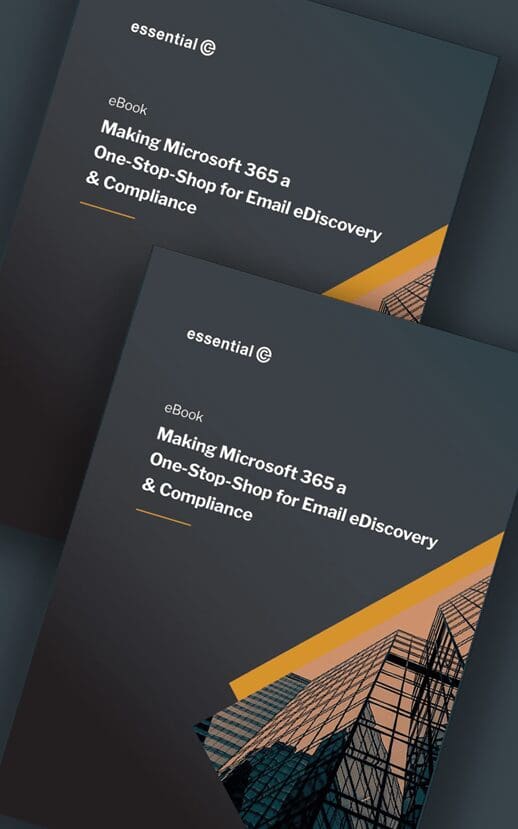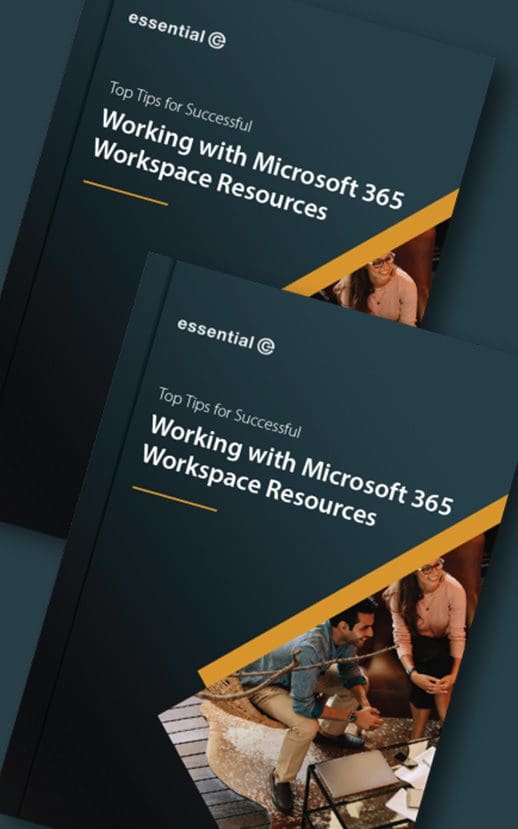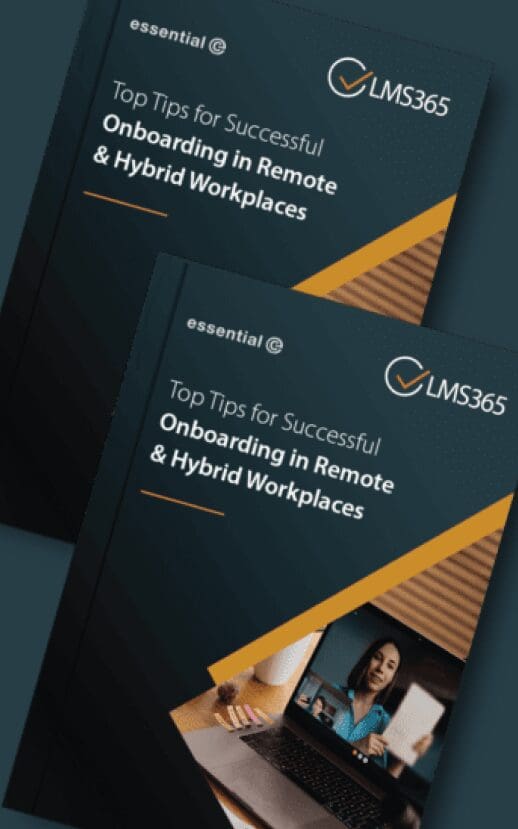Employee Engagement
Redefining Employee Engagement: How Millennials Are Shaping the Future of Workplace Culture
Introduction
A generational shift is underway in workplaces across the UK. Millennials, defined as broadly those born in the 1980s and 1990s are now a dominant force in the workforce, which is having an effect on workplace culture.
This generation champions flexibility, meaningful work, and personal well-being like never before. They’re less impressed by old-school hierarchies and rigid 9-to-5 schedules, and more concerned with whether an employer’s values align with their own. In fact, research shows two out of three millennials have chosen an employer based on that company’s values, and four in five say they need a sense of purpose to be satisfied in their job.
Likewise, work-life balance isn’t just a perk but a priority: 70% of UK employees feel that flexible working makes a job more attractive, and nearly a third would prefer flexibility to a pay rise. Which makes sense when you consider this age group also typically might have families or dependents, and might be at peak ‘juggling act’ phases in their lives.
As this recent study from PwC indicates, organisations that fail to address employee concerns are at increasing risk of losing great people and with it, competitive momentum.
This post explores how millennials are redefining employee engagement and shaping the future of workplace culture in the UK.
Millennials and Workplace Engagement: What’s Different?
Millennials have prompted managers to consider why engagement matters so much. Engagement is no longer just about a steady salary and the occasional team outing, it’s about creating an inclusive culture where employees feel valued, heard, and motivated to give their best. Let’s unpack three distinctive priorities millennials bring to the workplace, and how these differ from previous generations:
The Desire for Flexibility
Picture a working parent logging on at home at 9.15 AM after the school run, or caving into a demanding dog on a sunny day.

This is pretty much describes my situation: TBH I would struggle to remain in full time work without some degree of flexibility in where and how I work. This is why flexible working hours, remote work options, and a focus on outcomes over ‘clock-punching’ are hallmarks of the workplace today. Unlike older generations who often accepted strict schedules as a given, millennials prioritise jobs that accommodate their lives. The pandemic proved there can be another way, and the genie is proving hard to put back in the bottle.
A UK study found that 92% of millennials identify flexibility as a top priority when job hunting. It’s no surprise then that two-thirds of UK Gen Zs and millennials now opt for remote or hybrid work arrangements, when available.
Companies that embrace flexitime, compressed workweeks, or some degree of remote work are reaping the benefits in morale and productivity. For example, flexible work policies have been successfully implemented by numerous UK companies, some offer ‘core hours’ when everyone is available, with the rest of the schedule left to the employee’s discretion, while others have tried four-day workweeks.
The payoff is tangible: when people can balance work and life, they tend to be happier and more engaged.
An Emphasis on Purpose
For many millennials, a job is more than a regular wage slip, it’s also a platform for purpose and impact. Imagine an employee whose company encourages volunteering days each year. It’s highly likely that a stint mentoring a local youth (or volunteering for a favourite charity) would leave them feeling proud that their work life supports their values.
This generation is often driven by a sense that work should mean something beyond profit. Nearly all Gen Zs and millennials say they seek purpose-driven work. In practical terms, this means they are drawn to employers who integrate social responsibility, sustainability, and ethics into their business strategy. The UK Procurement Act is also driving Government supply chains to demonstrate sustainability and social values (to do and not just say).
UK businesses are responding by infusing purpose into their cultures. It’s no surprise then, that companies are increasingly putting their money where their mouth is with the number acquiring B Corp status doubling in the last few years to over 2000 in the UK today. B Corp certification signifies a commitment to high standards of social and environmental performance, accountability, and transparency.
As a result, employees feel part of something bigger and know how their roles contribute to society. This purpose-driven ethos pays off. When people believe in why their organisation exists, they’re more motivated, loyal, and even willing to go the extra mile, evidenced by the positive impact on profitability and productivity for employee owned companies, typically attributed to the sense of purpose employees feel.
The Need for Continuous Feedback
Gone are the days when an employee would hear from the boss only at the annual review. Millennials grew up in the workplace in the age of instant feedback – from social media likes to constant WhatsApp chats – and crave that same consistency at work.
For a millennial salesperson, waiting 12 months to find out how they’re doing would feel like driving blind for a year. The reality is that they thrive on weekly check-ins that help them adjust course and celebrate small wins.
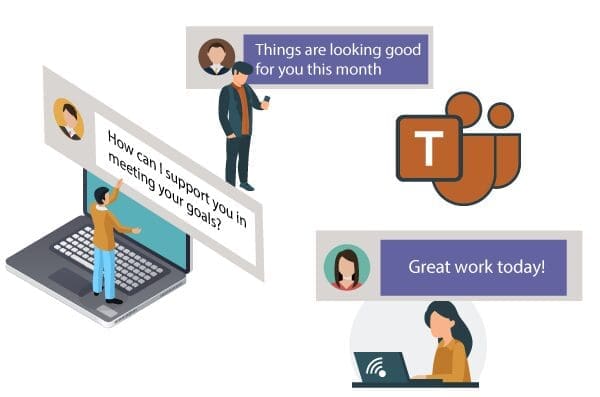
Continuous feedback and coaching are hugely important to this generation’s engagement.
In response, many organisations in the UK are shifting from formal, once-a-year appraisals to regular, shorter coaching conversations. It’s becoming more common for managers to hold bi-weekly or monthly one-on-ones focused on growth and goals, rather than just past performance, and it’s coming up more and more in our conversations with organisations looking to improve performance and engagement initiatives.
According to a PwC survey, nearly 60% of employees (and a striking 72% of those under 30) want feedback on a daily or weekly basis. They don’t want to be left in the dark about their performance, a sentiment echoed by 74% of millennials in one poll who often felt blindsided by traditional annual reviews.
Continuous feedback loops help people feel valued and to improve in real time. It also creates a culture of open communication and trust. UK HR surveys show that about 60% of millennials would like formal feedback at least every 1–3 months, yet 38% say they currently receive it only once a year or less. The message is clear: to engage millennials, employers should coach little and often.
Provide ongoing guidance, acknowledge accomplishments promptly, and work with employees on their development journey. By doing so, companies tap into millennials’ drive to learn and grow, which in turn boosts performance across the board.
Real-World UK Examples
A couple of examples here of UK organisations showing us how engagement can be done well:
The Co-op Group
The Co-op, a famed British member-owned cooperative, has long been mission-driven, but it has doubled down on engaging millennial employees through its values-based culture.
They invest in training employees on the Co-op’s core values and send executives to stores and offices nationwide to discuss how everyday work connects to community impact. Internal social platforms are used to share videos and stories of the Co-op’s community projects, keeping purpose front and centre.
Key outcomes include:
- The Co-op is now seen as an employer of choice for socially conscious professionals
- Teams feel their work makes a real difference, boosting morale and loyalty
- A transparent, purpose-led culture has led to lower staff turnover
Leonardo UK
Recently voted on Glassdoor one of the best places to work in the UK in 2025, Leonardo is characterised by a strong commitment to inclusion, diversity, employee development, and ethical practices.
Feedback from its own workforce as to what has helped win this accolade include:
“Flexible working, home working, supportive network of managers and peers, company benefits are amazing, quarterly get-togethers.”
Project Manager, Bristol
“Exciting projects to work on, good company culture, great work life balance, managers care about their employees.”
Principal Software Engineer, Edinburgh
In short, we’re proud to count Leonardo amongst our customers!
Key Pillars of Effective Engagement Strategies
1. Flexibility and Work-Life Balance
The traditional 9-to-5 fixed working day is gradually being replaced by more flexible arrangements, including remote work and hybrid models. This shift is supported by recent changes from the UK Government, which now gives employees the right to request flexible working from the very first day of their employment. The Pandemic also moved the dial in this respect.
70% of UK employees say flexible working options make a job more attractive. According to Tilly McHugh, Operations Manager at Haysmacintyre LLP,
“Having proved we were able to work very effectively remotely during the pandemic, we took the opportunity to re-think the way we work and have adopted a hybrid working strategy. We feel that the flexibility to work from home and visit the office as needed is what the modern workforce now expects as part of their employment terms. This strategy, together with our newly re-worked office facilities and workspace booking system, puts us in good stead to offer a very attractive hybrid working environment to both existing and prospective employees.”
Companies can support employees by implementing remote work policies, offering flexible start/finish times, or even considering compressed workweeks. The payoff is reduced stress, less burnout, and employees who want to do their best in work.
2. Purpose-Driven Culture
Millennials are often characterised as the ‘learning generation’ placing huge importance on career growth, learning opportunities, and regular feedback to improve. In one Gallup poll, 59% of millennials said opportunities to learn and grow were extremely important when applying for a job.
To engage this group, companies should invest in continuous development: think formal training programs, mentorship schemes, clear career paths, and of course frequent feedback – no one wants to wait a year to know how they’re doing.
This means moving away from one-off onboarding or annual training, and toward a culture of ongoing learning.
A number of our customers have a huge focus on this, offering online courses, personal development plans, training pathways, or ‘lunch and learn’ sessions to keep growth constant. When millennials see that their company is invested in their future, they feel valued and respond with higher engagement and loyalty.
4. Open Communications
According to a Deloitte survey, open communication and transparency are among the top drivers of job satisfaction for millennials.
It’s no surprise given that this generation grew up being able to directly message CEOs on Twitter (X) or get instant answers from Google (and now increasingly, AI).
They expect a similar openness and freedom from their employers.
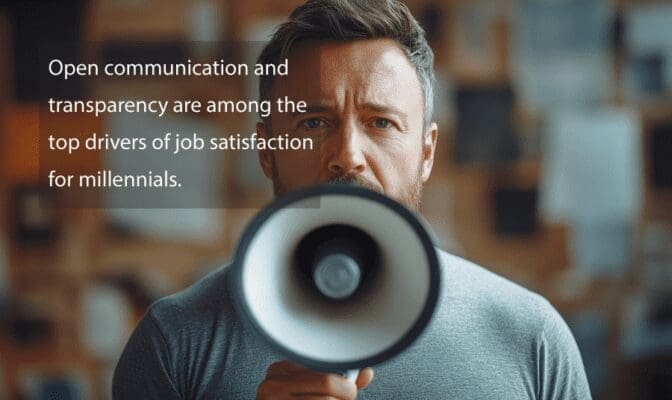
In practice, companies can use a range of internal social networks or have regular all-hands (Town Hall) meetings, Q&A sessions with executives (including hard questions), and encourage employees to speak up with ideas or concerns without fear.
Other routes to give your workforce feel heard include surveys, suggestion channels, or collaborative decision-making.
5. Recognition and Appreciation
We all like to be appreciated for our efforts, and millennials are no exception.
In fact, having grown up with constant feedback, millennials may need recognition to feel engaged at work. This doesn’t mean participation trophies for every task – it means fostering a culture where good work is noticed and praised regularly, not just when someone hits an anniversary or at year-end.
A simple ‘thank you’ from a manager, a shout-out in a team meeting, or a peer acknowledging a colleague’s help can go a long way. According to the UK Employee Recognition Survey carried out by Wildgoose, 53% of employees (across all ages) said they would like simple, regular in-person appreciation from management.
What matters most is sincerity. When people feel valued and appreciated, they develop a stronger emotional commitment to their work and employer. People who feel respected will consistently produce great work. Recognition isn’t just a pat on the back, it’s a strategic driver of performance and engagement.
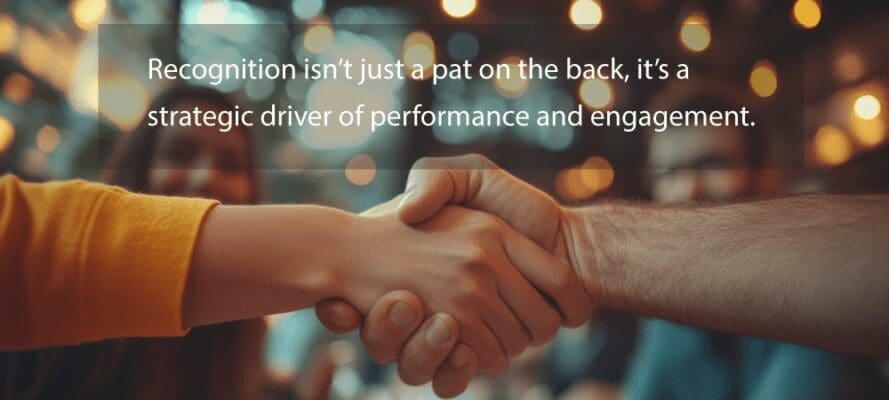
Technology That Supports Engagement
To effectively implement the above strategies at scale, organisations are using technology tools to support a digitally savvy generation. Millennials are comfortable using apps and platforms in every aspect of life and work is no different.
Here’s 3 examples of tech to support engagement you may wish to consider:
1. Digital Collaboration & Community
With hybrid and remote work on the rise, tools that enable seamless communication are vital.
Platforms like Microsoft Teams have become office staples for real-time chat and project collaboration. Beyond basic messaging, companies are building online communities through enterprise social networks. For example, we are seeing Microsoft Viva Engage gaining popularity among organisations as a way to create internal social groups where employees across locations can share updates, shout out achievements, and connect over common interests.
These ‘digital water coolers’ help recreate social interaction and inclusion, ensuring that even if half the team is working from home, everyone feels connected and heard. As we indicated earlier, Millennials particularly enjoy these platforms as they mirror the social media experience in a professional context, encouraging open communication, quick feedback (via reactions or comments), and a sense of belonging.
2. Continuous Feedback & Recognition Platforms
Technology can help weave recognition and feedback seamlessly into daily workflows.
For example, sending praise in Teams channels and embedding the Viva Engage web part in your SharePoint intranet is a good way to surface praise that colleagues can see. There are also dedicated pulse survey tools that let managers check in with their teams via short monthly surveys, keeping a finger on the pulse of engagement.
Other companies use feedback apps where employees can request feedback from peers or managers after completing a project, rather than waiting for an annual review.
Some performance management systems now include features for setting weekly goals and tracking progress, turning feedback into an ongoing dialogue.
This taps into the immediacy they enjoy: doing a great job on a presentation at 10 AM and getting a congratulatory shout-out by lunchtime can be very motivating.
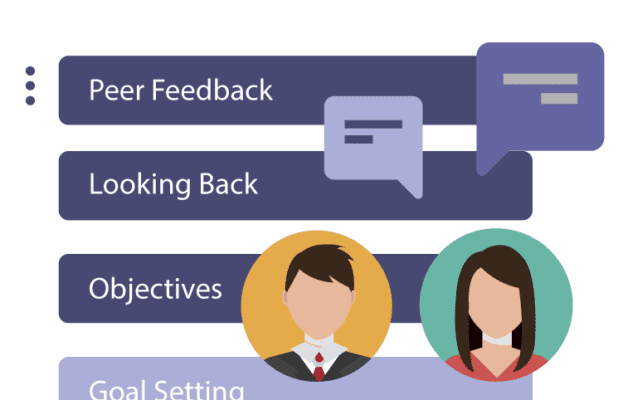
3. Online Learning & Development
Since continuous development is a priority, many UK firms are turning to eLearning and on-demand training solutions.
Learning platforms like LinkedIn Learning, or dedicated Learning Management Systems give employees the flexibility to upskill at their own pace.
If you adopt online learning, consider
- Allow learning freedom – Millennials love the autonomy of picking courses that interest them – whether it’s mastering a new coding language or improving their public speaking – and fitting learning around their schedule.
- Keep it short – Some employers are using a ‘bit sized approach’ to approach to engage the TikTok generation, by making learning short
- Make it flexible – making learning ‘on-the-go’ via mobiles (especially important for front-line workers).
- Go Hybrid – Look for a technology platform that supports hybrid learning. For example, combining on-demand learning with scheduled in-person and live remote training events.
By using technology for L&D, companies meet millennials where they are: on their phones or laptops.
Overcoming Common Challenges
Adopting engagement strategies isn’t without its challenges. Change can be hard, especially in established organisations with long-held traditions. But it is possible to achieve progress forward.
Getting Leadership Buy-In
Transforming workplace culture starts at the top. Senior leaders who hark back to a time of fixed office hours and top-down management might be sceptical of these new approaches – see Boomer Jamie Dimon of JP Morgan’s rant on the subject!.
Here’s our tips to get past this scepticism:
- Build a strong case for change by sharing real examples and stats – like the ones in this article – that show how things like flexibility can boost productivity and how recognition can lift performance.
- Run pilot programs, for instance, try a flexible Friday policy for a quarter and measure the results.
- Training can help managers at all levels understand new ways of managing, such as giving effective feedback in real-time, instead of saving it all for an annual review.

Maintaining Engagement in Hybrid Settings
Hybrid working can inadvertently create engagement disparities. A common challenge is ensuring remote employees feel as included and connected as those on-site. Without deliberate effort, communication can default to ad hoc chats among those physically present, while remote staff may feel isolated or miss out on timely information.
To combat this, companies should establish remote-friendly practices: for example:
- Getting everyone in a hybrid Teams meeting to join via their own screens, so that everyone is on equal footing.
- Scheduling regular virtual team socials or coffee chats to help replace the informal bonding that happens in person.
It’s also crucial to be mindful of social interaction and mental health in a hybrid model. A recent UK survey found 78% of young workers said a lack of social interaction was a key factor that would make them consider changing jobs.
Suggestions to boost social interaction include:
- Managers should encourage team camaraderie and check in on well-being, especially with those working remotely.
- New hires should be assigned ‘mentors’ or ‘buddies’ to new hires to ensure they integrate well, regardless of location.
- Team spirit can be boosted by using video calls, chat tools, and occasional in-person meetups or offsite team-building ‘jollies’.
The goal is to ensure no one feels like a second-class employee – everyone should have equal access to feedback, development, and recognition, whether they’re sitting in the office or at their kitchen table.

Ensuring Equity Across Different Work Arrangements
A concerning finding of a survey carried out by Reed was that staff who work from home are less likely to be promoted than those that visit the office regularly.
Companies must guard against unconscious bias that might favour those who follow a traditional schedule or are more visibly present. For example, if promotions or ‘plum projects’ consistently go to people that regularly visit the office, this will undermine the promise of flexibility and will disengage those working to a different pattern.
To ensure fairness, performance should be measured by results, not face time. Setting clear objectives and KPIs for each role helps managers evaluate employees on output and impact, regardless of how or when the work was done.
Onboarding New Starts & Instilling Corporate Culture
How do you effectively onboard employees you may never see face-to-face? Check out this Reddit forum that cites onboarding new starts as a good reason for coming back into the office.
It’s true: a poor onboarding experience can lead to employees feeling confused, isolated and left out of the loop in comparison to their ‘pre-hybrid’ counterparts. This ultimately impacts productivity and the bottom line.
However, it looks like the ‘return to office’ horse has now bolted, meaning organisations must now rethink how they structure the learning journey and track employee progress to ensure all the necessary bases are covered and knowledge transfer happens effectively, even in a hybrid or remote setting.
Thanks to collaborative platforms like Microsoft Teams, new hires can work together on tasks, access subject matter experts through Teams channels, and participate in live virtual classrooms, complete with breakout rooms for group assignments, whiteboards for team brainstorming and polls for gathering delegate feedback.
There’s also L&D platforms that support both in-person and remote assessments that are reviewed by a line manager or instructor, along with progress tracking.
A well-designed, well-maintained company intranet can also help convey company values and create connections by providing regular updates and insights into the wider business environment and, fir example, community noticeboards and groups for like-minded co-workers to engage over shared interests.
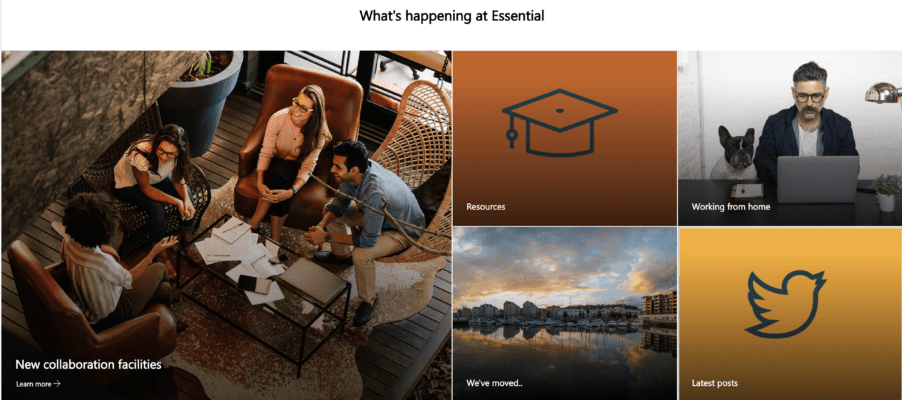
Conclusion
As we’ve seen, millennials are not ‘ruining’ the workplace, they’re rejuvenating it. By demanding flexibility, insisting on purpose, welcoming feedback, and expecting authenticity, millennials are paving the way for Gen Z. They have set a new course for what healthy workplace culture should look like.
Organisations that embrace these values are finding it leads to more than just happy employees. It creates a foundation for innovation, resilience, and growth. When people are engaged they deliver better results. They stay longer, reducing turnover costs and reducing the hiring headache. They advocate for your brand, attracting customers and new talent alike. In essence, engagement is the engine of performance, and millennials have handed us the blueprint for tuning that engine in the modern era.
The future of workplace culture in the UK will be one that blends work with life, profit with purpose, and technology with human connection. It’s a future where Monday morning might find some employees in the office lounge with lattes, others dialling in from home after the ‘school run’ or a doctors appointment, all collaborating on a shared goal they deeply care about.
The companies that engage the whole person, not just the employee, will be the ones that flourish.
Want to learn more about our learning & engagement solution for Microsoft 365?
Get in touch to arrange a chat or a demonstration.














